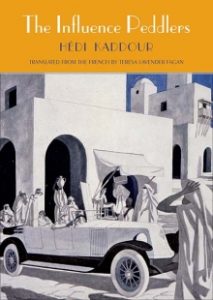 [Yale University Press; 2017]
[Yale University Press; 2017]
Tr. by Teresa Lavender Fagan
The Influence Peddlers will be difficult to shelve — historical fiction, bildungsroman, adventure, social realism, and even something approaching allegory can each by turns describe this new translation of Hédi Kaddour’s prize-winning novel, Les Prépondérants. The narrative itself is equally multiple and varied, with diverse plotlines forking and intersecting in a Gordian tangle paralleling the predicament of the setting: North Africa and France just before the early twentieth-century wave of decolonization. The novel begins with a rudimentary (if foreboding) land dispute between the recalcitrant Arab widow Rania and the stubborn French settler Ganthier outside the fictional North African city of Nahbès, moves quickly to that city’s invasion by American filmmakers eager to cash in on the early cinema boom with the gritty realism of on-the-scene moviemaking, follows Rania’s brilliant young cousin Raouf falling in first courtly then carnal love with the underappreciated (and married) American actress Kathryn Bishop, all while fostering a sense that soon the powder keg of abrading Arab, European, and American worlds will explode and lay one or more low in the process. That admittedly overlong sentence describes only a fraction of what The Influence Peddlers manages to explore; it is a book that challenges summary as much as it challenges categories and boundaries, as any book worth reading should.
But the novel’s broad scope is only its secondary attraction. This book is not so much about the movement of history as the minute vicissitudes of business, friendship, politics, and love between complicated and often deeply flawed characters. The relationship between Raouf and Ganthier is the most moving and complex study of this dynamic — the novel’s second part centers on Ganthier guiding Raouf through Europe at the direction of Raouf’s father, who wants to keep his son out of the increasingly revolutionary, nationalist, and even communist circles he had begun haunting in the capital of the unnamed French “protectorate” (i.e., colony) where the majority of the novel takes place. Ganthier and Raouf have known each other since the latter’s birth and were always close, but the parallel courses of their lives have hardened each into political positions at significant odds with one another. Still,
a strange relationship had formed over the years between Raouf and the colonist, like a fable, the fox and the wolf. They hate each other yet seek each other out. They like to talk together, and compete for the best words. The wolf helps the fox become an adult so he can take advantage of his talents, use his strength and his wile on a fox who begins to develop his own, and the fox knows that it will be in his confrontation with the wolf, and not through respect for patriarchal rules, that he will invent his future life.
As the above intimates, the proverbial wolf and fox cannot help but maintain a respectful and even at times tender fondness for each other in spite of their formal opposition. Ganthier is quietly proud of the unmitigated genius of his young charge and Raouf often defers (however grudgingly) to the experience and fortitude of the old army veteran. This unavoidably broad summary might lead more critical readers to wonder if Kaddour, despite his own Tunisian roots, is sketching some kind of metaphorical apology for colonialism, but very much to the contrary, what the novel explores is something subtler: that frustrating but unavoidable recognition that people are often too complicated to be separated onto one “side” or another except provisionally, and that at times we might find ourselves loving those who offer the deepest challenge to who and what we think we are. Loving despite oneself — the idea is probably trite, but Kaddour’s treatment has the power to make the reader wonder whether such commonplaces are well-worn for a reason.
With characteristic snark Ganthier epigrammatizes The Influence Peddler’s ubiquitous theme: “Our dear revolutionary is discovering the omnipresence of contradiction.” Contradiction, misunderstanding, translation and what is lost or gained thereby . . . in brief, the notion of butting up against something fundamentally “other” and attempting to cope with such a transformative experience is a theme the novel returns to again and again. The Influence Peddlers is in this way “world literature” to the core — not in the barren sense of “literature written in places other than the US or Europe,” but in the sense that it explores and pushes at the limits of what it means to be part of a particular world, to cross between worlds, to (try to) transform one’s world. “Your compatriots aren’t happy that I’m in a gray suit,” says Raouf to Ganthier when first embarking for France from North Africa,
“They’re friendlier to the two old men in burnooses. I even heard a woman say that she found them more handsome in those than in Western-style dress.” Ganthier responded:
“The French don’t like to be imitated.”
“It’s more that they don’t like anyone to catch up with them.”
“It’s not a question of imitation or of catching up … They feel that you won’t want them anymore.”
“What’s funny,” said Raouf, “is that you can’t stand it when they look down on me. Because I am one of your pieces of luggage?”
These moments of friction-between-worlds during Raouf and Ganthier’s “great voyage” increase in intensity in Alsace, then recently ceded to France as part of the Treaty of Versailles, where they encounter a host of polyglots all attempting to make one another understood. Ganthier is predictably uncompromising in his allegiance to French coherence — “[Germans] confuse rhyme with reason. French, on the contrary, is the language of reason . . . Passions may move us, but French syntax is unbending!” Not resting on the old colonist’s intransigence, the oneiric and unpredictable narrative voice wends away from Ganthier’s pat evaluation to explore an environment where characters find themselves constantly “in the headiness of a shared between-two-worlds, which was suddenly more attractive than either world taken separately,” a “between-two-worlds” where Arab, European, and American alike discover themselves “strangers opposite the other.” The “moment of vertigo” that occurs when being “shared between-two-worlds,” the experience of finding oneself a stranger, is not merely the focal point of the characters’ various journeys in The Influence Peddlers, but a profound challenge to the reader.
So — if the paradoxical reduction can be forgiven — this is a challenging novel. But this is so for many reasons beyond merely what its generic multiplicity, labyrinthine narrative, and broader insistence on reevaluating one’s notion of self when encountering the Other demand of the reader. In a book so attentive to how difficult it is to travel between languages, for example, it’s unsurprising that some of its more idiosyncratic intricacies of style do not (and perhaps cannot) come across smoothly. While the almost incessant free indirect discourse — which lends the work its dreamlike, hypnotizing quality — manages to pair oddly well with the at times deliberately harsh realism of the events it narrates, Kaddour’s constant piling-on of subordinate clause after subordinate clause in frequently half-page long sentences where tenses and subjects shift multiple times sound, frankly, more graceful in their original Latinate formulations but often come across as breathless in Teresa Lavender Fagan’s occasionally angular rendering. Putting aside stylistic quibbles, though, attending to this slight “static” engendered during the work’s transmission between French and English can offer an opportunity to reflect precisely on the broader ramifications of translation, its cultural charges and political affordances, as well as how such friction can turn out to be as significant as what comes across smoothly.
A prescient scene in the novel itself exploits precisely this dissonance to illustrate a political point — occurring just after the scene described above, Raouf, Ganthier, and their multilingual companions witness a demonstration in which Alsatian protesters sing “La Marseillaise” in German to infuriate the French soldiers surrounding them: “Kinder des Vaterlands, enfants de la patrie, Tyrrannei blutiges Banner . . . l’étandard sanglant . . . The Germans had already sung ‘La Marseillaise’ against their kings and princes in 1848, but this time they were singing it against the French, loudly, in voices that became more harmonious.” This simple détournement of the revolutionary anthem, grating on the ears of the French soldiers (as well as those of Ganthier), mobilizes French rhetoric against France itself to send a clear message — in the words of Raouf and Ganthier’s traveling companion Gabrielle, “The Germans are singing the revolution that we are no longer fighting for!” This depiction of those Alsatians who believed France was an occupying force after the signing of the Treaty of Versailles underlines the novel’s primary political concern, namely, national sovereignty; after the demonstration and ever sarcastic, Raouf, the budding but fitful nationalist, asks Ganthier, “Will you denounce me if I admit that this morning I feel a bit German?”
There occur many such scenes of translation and mistranslation (deliberate and otherwise). To mention just one more, there is the episode where an early supporter of Hitler mangles the recitation of his “favorite” maxim of La Rochefoucauld, which Raouf astutely corrects in a hilarious exchange in which the young Arab offers a brief lesson on the rhetorical function of chiasmus to the chagrined proto-Nazi. Most of these scenes follow this model of blending humor into otherwise serious situations to the end of upsetting racial and cultural stereotypes, a project that is clearly important to Kaddour both in and beyond The Influence Peddlers.
Turning in conclusion to that broader project itself, it is relevant to bear in mind that this book won the prestigious Grand prix du roman de l’Academie française in 2015, sharing the prize with Boualem Sansal’s 2084: la fin du monde. While I admit I know little about the politics of French literary prizes nor have I read Sansal’s novel in full, the fact that Kaddour’s book won one of France’s highest literary honors jointly with a novel about the terrors of living under an Islamic totalitarian regime seems to say at least something worthy of note. At first it’s perhaps obvious: Kaddour’s work does not exist in a political vacuum. There is what seems to me a justifiable perspective from which his joint prize with Sansal can be read as a kind of cultural sublimation of a current in the French liberal unconscious, where a justified anxiety over the rise of Islamic extremism and its attendant horrors is paired with an equally justified anxiety over the insidious and rampant spread of Islamophobia. Sansal expresses the former — vociferously and often incisively, his ham-fisted Orwell reference notwithstanding — and Kaddour, whose caringly woven tapestry illustrates nothing if not that Muslims and their worlds (note the plural) are infinitely more complex than can be grasped either by those who wish to bar them en masse from crossing borders or those who stand under a certain black flag, expresses the latter. Their auspicious pairing for the 2015 Grand prix du roman thus makes a simple statement: Let’s celebrate Muslims, but let’s be careful of them too.
The degree to which one finds either the left- or right-hand portion of that formulation problematic is likely inversely proportional to one’s degree of investment in respectively left- or right-wing politics, a balance the Academie française appears careful to maintain. But before holding Kaddour up unequivocally on the “side” he appears to champion, it would be remiss of this review not to follow its own subject’s lead and ask whether or not such sharp distinctions come to blur on closer inspection.
Take the figure of the Muslim woman — specifically, the character of Rania, with whom the novel begins. It is not especially controversial, I think, to say that western media in general has trouble representing Muslim women. The multiple attempts in France to legislate Muslim women’s self-representation through the literal legislation of their clothing is only the most blatant example of this. French debates on the hijab, niqab, and burqa largely center around the issue of equality amongst the sexes, with legislators claiming that traditional Muslim women’s clothing is detrimental to such equality. The underlying assumption is of a tacit zero-sum game between representing oneself as (or in some extreme cases even being) a Muslim and the ability to hold values associated with western liberal democracy, which is often set up in ways that Muslim men are not as immediately subject to as women. The figure of Rania plays into this narrative in a way that further entrenches rather than disrupts this kind of one-side-or-another option given most Muslim women in the west. Her penchants for driving, running and working on a farm, arguing with her male family members, reading novels in public, and (in a brief though groan-inducingly predictable scene) foregoing her headscarf place Rania firmly in the tradition of representing Muslim women as interesting only insofar as they approximate the habits and values of western women. Of course Rania, like any woman, should of course be able to do what she damn well wants, but being the only major female Muslim character in the novel makes her conspicuously western choices seem not so much a navigation of female Muslim identity as so many dog-whistles for western readers for whom the Muslim woman qua Muslim woman is a boring, “unenlightened,” or even pernicious figure.
So, if increasingly Islamophobic western cultures can be collectively taken as Troy, The Influence Peddlers at its best is a Trojan Horse in which not all the soldiers fit — or at least fit comfortably. Pointing this out does not in and of itself “give” us much, except hopefully an awareness of how difficult and especially how crucial it is to attend to the dynamics of the horizons we seek to broaden. That is, after all, the very challenge posed by the novel.
This post may contain affiliate links.







